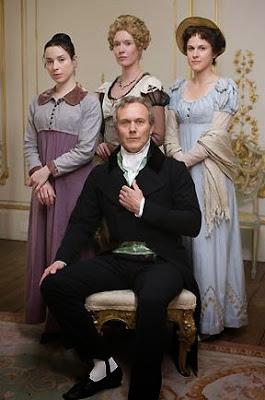 by guest blogger Victoria
Grossack
by guest blogger Victoria
Grossack
Some may think that focusing on the art and importance of persuasion in Jane Austen’s last written novel, Persuasion, is inappropriate, for she did not choose this title herself. The book was published after her death, and its title chosen by one of her brothers, Henry Austen. While writing it Jane called the story “The Elliots.” Henry Austen likewise chose the title for his sister’s other posthumously published work, Northanger Abbey, called“Susan” during Jane Austen’s life (readers may notice that Northanger Abbey has no Susan in it; when Jane Austen revised this work, she changed the heroine’s name from Susan to Catherine).Henry Austen may have selected the titlePersuasion based on its similarity to the titles of two of his sister’s other successful works: Pride and Prejudice and Sense and Sensibility. Perhaps Persuasion, being shorter, merits only a single word.
Jane Austen’s other novels contain explicit examples of persuasion that are vital to their plots. In Sense and Sensibility, John Dashwoodis persuaded by his wife not to assist his half-sisters. Pride and Prejudice’s Mr. Bingley is persuaded by his sisters and Mr. Darcy to stay away from Jane Bennet, a decision he regrets and eventually puts aside. Emma persuades Harriet Smith that Mr. Elton is in love with her. The Thorpes persuade General Tilney that Catherine Morland is broke.Fanny Price is pressured by many to accept Henry Crawford as a suitor in Mansfield Park; even though she is generally considered the weakest of the heroines, she resists firmly.
Even if the title was chosen by her brother rather than Jane Austen herself, the problem of persuasion is at the core of this novel. Romantic difficulties exist only because Lady Russell, the best friend of Anne Elliot’s late mother, persuaded Anne to break off an betrothaleight years before. Anne regretted it then, and has regretted it since.Due to coincidence and circumstance, she is thrown together once more with her former suitor. Frederick Wentworth is now risen in the world, having made his fortune and having been promoted to captain, while Anne’s family, thanks to her father’s profligacy, is suffering under the disgrace of debt. Captain Wentworth still resents Anne for letting herself be talked out of a marriage that would have meant so much to them both.

So this is an example of the ill-effects of persuasion. There are many other instances of persuasion in Persuasion. An early example is shown when Mr. Shepherd, the lawyer of Sir Elliot, Anne’s father, with the awkward task of having to persuade his vain client to do something about his finances. His approach is very careful:
Mr. Shepherd, a civil, cautious lawyer… would rather have the disagreeable prompted by anyone else.
 Mr. Shepherd waits until his client
states, in a fit of pique, that he would rather leave Kellynch Hall than live
in it in reduced circumstances, and treats this a serious suggestion. Mr. Shepherd’s method of persuasion is
effective, and heconvinces Sir Walter Elliot to rent out his estate and move to
Bath. This change in situation allows
the baronet to live within his means and to startpaying his creditors. Few would believe that Mr. Shepherd’s
persuasive efforts was unjustified. This
instance of persuasion in Persuasion
is justified by both the circumstances of Sir Elliot’s finances and by Mr.
Shepherd’s expertise. Finally, it is
beautifully done.
Mr. Shepherd waits until his client
states, in a fit of pique, that he would rather leave Kellynch Hall than live
in it in reduced circumstances, and treats this a serious suggestion. Mr. Shepherd’s method of persuasion is
effective, and heconvinces Sir Walter Elliot to rent out his estate and move to
Bath. This change in situation allows
the baronet to live within his means and to startpaying his creditors. Few would believe that Mr. Shepherd’s
persuasive efforts was unjustified. This
instance of persuasion in Persuasion
is justified by both the circumstances of Sir Elliot’s finances and by Mr.
Shepherd’s expertise. Finally, it is
beautifully done.
A less effective instance of persuasion is demonstrated when Anne Elliot warns her older sister Elizabeth about the dangers of an intimacy with Penelope Clay. She knows that her advice will be unwelcome but out of her scrupulous loyalty to her family gives her opinion anyway. Her sister Elizabeth lets Anne know how unwelcome her words are:
“…However, at any rate, as I have a great deal more at stake on this point than anybody else can have, I think it rather unnecessary in you to be advising me.”
Anne had done; glad that it was over, and not absolutely hopeless of its doing good. Elizabeth, though resenting the suspicion, might yet be made observant of it.
Jane Austen reminds us in these two examples that persuasion is a difficult and uncertain business, requiring tact and patience. Too often people expect the instant gratification of immediately convincing someone of something, and become frustrated when they do not succeed. Austen knew that people resist being persuaded when the advice goes against what they want to believe. There are instances in Persuasion when one character realizes that trying to persuade another is hopeless, as when Anne’s younger sister Mary knows when her husband’s mind is made up.
 Persuasion
clearly shows the dangers of not being firm – and
of not seizing the moment – when one believes one is right. Although this is a novel of second chances, Jane
Austen knows very well that second chances do not always occur. We can see that Anne has acquired more
firmness of character in the years since she ended her engagement with
Wentworth, for she has a deep sense of what is right and will not swerve from
it. Yet firmness, insistence on one’s
own way, is not always wise. Louisa
insists on jumping down from styles while in Lyme, but ends up having an
accident. Because she hasinsisted on her
way, she ends up in a coma.After this Jane Austen writes:
Persuasion
clearly shows the dangers of not being firm – and
of not seizing the moment – when one believes one is right. Although this is a novel of second chances, Jane
Austen knows very well that second chances do not always occur. We can see that Anne has acquired more
firmness of character in the years since she ended her engagement with
Wentworth, for she has a deep sense of what is right and will not swerve from
it. Yet firmness, insistence on one’s
own way, is not always wise. Louisa
insists on jumping down from styles while in Lyme, but ends up having an
accident. Because she hasinsisted on her
way, she ends up in a coma.After this Jane Austen writes:
Anne wondered whether it ever occurred to him (Captain Wentworth) now, to question the justness of his own previous opinion as to the universal felicity of firmness of character; and whether it might not strike him that, like all other qualities of the mind, it should have its proportions and limits.
Perhaps this is where Jane Austen’s philosophy rests. Although her characters frequently profess absolutes, Jane Austen does not, and realizes that chance also plays a role. Even Captain Wentworth acknowledges that there was a fair probability, early in his career, of his sloop being sunk by bad weather. In that case his deathwould have been noted in some small newspaperparagraph and Lady Russell’s advice to Anne Elliot not to marry him would have been wise. Jane Austen sometimes gives credit to what today is called “outcome-based morality.”
 Persuasion is a novel with a happy end, and so Anne Elliot and Captain
Wentworth get back together. She asks
him if he will ever forgive Lady Russell for the bad advice she gave eight
years before. Captain Wentworth replies
that he is considering it. Then he asks
Anne if he would have accepted her if he had returned to Kellynch and proposed
again six years ago. When she tells him
yes, he says:
Persuasion is a novel with a happy end, and so Anne Elliot and Captain
Wentworth get back together. She asks
him if he will ever forgive Lady Russell for the bad advice she gave eight
years before. Captain Wentworth replies
that he is considering it. Then he asks
Anne if he would have accepted her if he had returned to Kellynch and proposed
again six years ago. When she tells him
yes, he says:
“It is not that I did not think of it… This is a recollection, which ought to make me forgive every one sooner than myself. Six years of separation and suffering might have been spared.”
Persuasion demonstrates the deep responsibility that comes with persuasion, and reminds us that we should proceed with caution on the advice we receive from others and also take care with the advice we give. Finally Jane Austen shows us that we should even be cautious with the advice we give ourselves.
Victoria Grossacks the author of “The Highbury Murders: A Mystery Set in theVillage of Jane Austen’s Emma.” Victoria studied Creative Writing and English Literature at Dartmouth College, and is co-author with Alice Underwood of the Tapestry of Bronze series, novels based on Greek myths and set in the late Bronze Age. She is also the “Crafting Fabulous Fiction” columnist at www.writing-world.com. Visit her website at www.tapestryofbronze.com, or contact her at tapestry (at) tapestryofbronze (dot) com.
(images from ITV Persuasion 2007)

